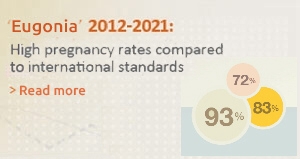When the blastocyst has settled (implanted) in the uterus, the developing placenta (trophoblast) produces a hormone called b-human chorionic gonadotrophin (b-hCG). This hormone is detectable in the blood 10 days after the embryo transfer and in the urine of the pregnant woman some days later (pharmacy pregnancy test kit).The test requires a blood sample and the result is obtained three hours later. If the test is positive it is repeated after 2 days.The multiplication of the initial value indicates normal progression of pregnancy, which is termed 'biochemical’ at this stage (as it is only demonstrated by the biochemical detection of hCG).
See more: Pregnancy rates at Eugonia






























